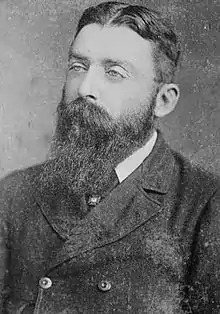John Sheehan (New Zealand politician)
John Sheehan (5 July 1844 – 12 June 1885) was a 19th-century New Zealand politician. He was the first New Zealand-born Member of Parliament elected by a general electorate (rather than a Māori electorate) and he was the first New Zealand-born person to hold cabinet rank. [1]
John Sheehan | |
|---|---|
 Sheehan circa 1884 | |
| 5th Minister of Justice | |
| In office 13 October 1877 – 8 October 1879 | |
| Prime Minister | George Grey |
| Preceded by | Charles Bowen |
| Succeeded by | William Rolleston |
| Personal details | |
| Born | 5 July 1844 Auckland, New Zealand |
| Died | 12 June 1885 (aged 40) Napier, New Zealand |
| Spouse(s) | Lucy Caroline Young |
Biography
Early life and career
Sheehan was born in Auckland in 1844. He was educated at St Peter's School under the guidance of his teacher, Richard O'Sullivan[2] and where he knew another later Cabinet Minister, Joseph Tole.[3]
Political career
| New Zealand Parliament | ||||
| Years | Term | Electorate | Party | |
| 1872–1875 | 5th | Rodney | Independent | |
| 1876–1879 | 6th | Rodney | Independent | |
| 1879–1881 | 7th | Thames | Independent | |
| 1881–1884 | 8th | Thames | Independent | |
| 1885 | 9th | Tauranga | Independent | |
He was the Minister of Justice and the Minister of Māori Affairs from 1877 to 1879.[4] He represented several North Island electorates: Rodney from 1872 to 1879, then Thames from 1879 to 1884, when he was defeated (for Napier by John Davies Ormond).[5][6] He then represented Tauranga from a by-election on 22 May 1885 until he died shortly after on 12 June.[5]
A fluent Maori speaker and a lawyer, he is noted for his efforts with the Repudiation Movement in the 1870s to solve land issues on behalf of Hawkes Bay Maori chiefs who claimed large European land holders, such as McLean, had acquired land improperly. The Repudiation Movement failed but Sheehan gained a positive reputation with Maori leaders. In 1877 he became Native Minister in the Grey Government. He tried to negotiate land deals in Taranaki with iwi leaders and, in respect of the King Country, with King Tawhaio, but failed. However, during these meetings he discovered that Rewi Maniapoto wanted to sell land and negotiated land sales to Europeans in the King Country that the government hoped would speed up assimilation. Sheehan negotiated unsuccessfully with Te Whiti whose base of Parihaka was destroyed by the Armed Constabulary in November 1881 after Sheehan had ceased to hold ministerial office (in 1879).[2] Sheehan was also active in promoting secular education and widening the franchise but he wanted only one system of Parliamentary representation, the abolition of separate Maori seats and the end of plural voting. He was one of the first ministers to advocate breaking up of the large runholder monopolies which he believed had created a social elite at the expense of the normal citizen.[2]
Notes
- Scholefield 1940, p. 295.
- Waterson, D. B. "Sheehan, John". Dictionary of New Zealand Biography. Ministry for Culture and Heritage. Retrieved 7 April 2011.
- Cyclopedia Company Limited (1902). "Hon. Joseph Augustus Tole". The Cyclopedia of New Zealand : Auckland Provincial District. Christchurch: The Cyclopedia of New Zealand. Retrieved 24 February 2012.
- Wilson 1985, p. 67.
- Wilson 1985, p. 234.
- "The General Election, 1884". National Library. 1884. p. 1. Retrieved 17 March 2012.
- "Town edition". The Daily Telegraph (5944). 24 September 1890. p. 3. Retrieved 14 March 2020.
References
- Scholefield, Guy, ed. (1940). A Dictionary of New Zealand Biography : M–Addenda (PDF). II. Wellington: Department of Internal Affairs. Retrieved 19 November 2015.
- Wilson, James Oakley (1985) [First ed. published 1913]. New Zealand Parliamentary Record, 1840–1984 (4th ed.). Wellington: V.R. Ward, Govt. Printer. OCLC 154283103.
| New Zealand Parliament | ||
|---|---|---|
| Preceded by William Rowe |
Member of Parliament for Thames 1879–1884 Served alongside: George Grey |
Succeeded by William Fraser |
| Preceded by George Morris |
Member of Parliament for Tauranga 1885 |
Succeeded by Lawrence Grace |
| Political offices | ||
| Preceded by Charles Bowen |
Minister of Justice 1877–1879 |
Succeeded by William Rolleston |